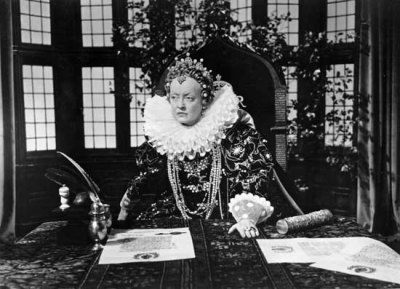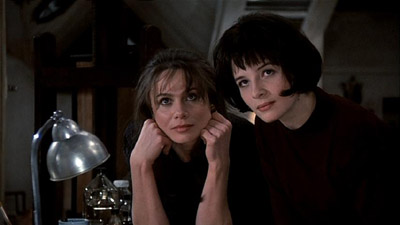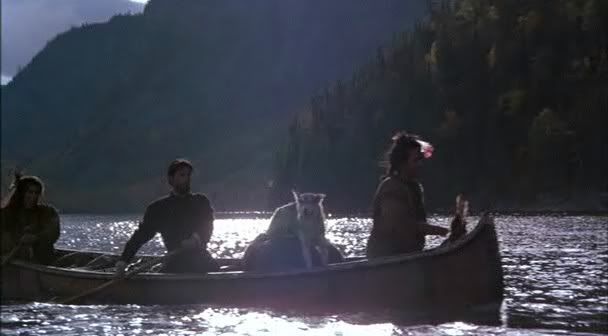I'm going to just go ahead and list mine. It's been so long. I doubt I can write anything too significant.
The International (Tom Tykwer, 2009)
-- This is probably as suspenseful as such a complex mystery involving financial corporation corruption and "crimes against humanity" could be.
Pontypool (Bruce McDonald, 2008)
-- Intense, claustrophobic thriller, set in a Canadian radio station, plays out similarly to Orson Welles' broadcast of
The War of the Worlds. Stephen McHattie provides a wonderful voice and some rebellious authority.
Harold and Maude (Hal Ashby, 1970)
-- Almost perfect combination of black comedy and life-affirming romance with some fun anti-authority gibes thrown into the mix. It's often not given enough credit for being wonderfully photographed, edited and scored.
Bullets Over Broadway (Woody Allen, 1994)
-- One of Woody's best (and probably his best without him being in the film) tells of a conflicted writer, mobsters, Broadway theatre, molls becoming actresses, hitmen becoming playwrights and simple life lessons learned, the most-prominent of which is that the writer shouldn't speak.
The Fury (Brian DePalma, 1978)
-- Fun big-budget sell-out from the director plays even better if you think of it as a comedy. It's mostly played seriously (which contributes guffaws), but Kirk Douglas seems to be in on the joke, and the pyrotechnical finale with John Cassavetes is a hoot.
Great Balls of Fire! (Jim McBride, 1989)
-- Silly but exuberant biography of '50s rocker Jerry Lee Lewis. I've always said that Dennis Quaid's inspiration for Lewis was Disney's Goofy, but he almost seemed sedate this time. However, his PG-13 sex scene with Winona Ryder (playing a 13-year-old) is still pretty hot.
Casey's Shadow (Martin Ritt, 1978)
-- Likable family drama about a Cajun horse trainer (Walter Matthau) who, along with his sons, tries to accomplish his dream of winning a major race, even after the horse is injured. It gets plenty of mileage from Matthau whose character actually seems in the wrong half of the time.
Destiny (Fritz Lang, 1921)
+ -- Big Lang production about Love and Death, with a principal story set in medieval times and then three alternate worlds set in Persia, Venice and China. There are opulent sets and special effects as this film clearly was a stepping stone to Lang's later
Metropolis. Besides that film, it seems to have inspired
The Thief of Bagdad, The Adventures of Prince Achmed and even
The Seventh Seal.
Lucky Lady (Stanley Donen, 1975)
-- Big commercial flop and troubled production aside, this flick still provides plenty of entertainment as it tells of bootleggers off the California coast doing battles with both the Coast Guard and the Mob. It's certainly nothing great, but Liza Minnelli, Gene Hackman and Burt Reynolds do make a good team, and there are several colorful supporting characters and actors.
The Ghost Writer (Roman Polanski, 2010)
-- Slow-buildng political/murder mystery plays out complexly and humorously leading up to some wonderful confrontations as it approaches its conclusion. Its main intention I believe is to keep you guessing who really did what and who knew it, and it's wildly-successful at that. I really loved the Alexandre Desplat musical score and the cinematic simplicity of the final shot which actually brings the film full circle to where it physically began.
The Unbearable Lightness of Being (Philip Kaufman, 1988)
+ -- Elegant, erotic and fascinating film about Czechoslovakia in the 1960s covers lots of personal and political ground in its three hours. The problem I have, occasionally, is that the elongated scenes seem to work better when they're erotic than they do when they're political. I think my fave scene is when the two women take photos of each other in various states of undress. The dancing scene followed by the telegram is also powerful, but even though the film is watchable, it left me underwhelmed. Much in the same way that I can both admire and dislike Daniel Day-Lewis's main character, the film leaves me ambivalent and a bit cold. It is a serious attempt though by a world-class filmmaker to film a world-class novel, and most people feel it succeeds.
Jagged Edge (Richard Marquand, 1985)
-- This is the opposite of the last one. It's a pulpy murder mystery but all it wants to do is rub sex and violence (and red herrings and some preposterousness) in your face. It succeeds at that and provides good entertainment. Jeff Bridges plays the accused murderer and Glenn Close is his defense attorney. Pariah screenwriter Joe Ezterhas topped himself later on with
Basic Instinct.
House Calls (Howard Zieff, 1978)
-- Enjoyable romantic comedy with Walter Matthau and Glenda Jackson as the intelligent, witty lovers and addle-brained Art Carney playing the quack head of a hospital. Old-fashioned in the best sense of the term, it provides smiles and laughs. Too bad the DVD still doesn't have George Harrison's "Something" playing during the romantic montage.
Black Robe (Bruce Beresford, 1991)
-- Beautiful photography, harsh violence and one of my all-time favorite musical scores (by Georges Delerue) help make this film a powerful comment on what it must have been like living in Canada in the 17th century. It basically tells the story of a young French Jesuit priest (Lothaire Bluteau) who travels with the Algonquin to a mission founded in the heart of the dangerous Iroquois country of Quebec. The film succeeds through its physical reality and its emotional honesty and even-handedness.
Gastonbury (Julian Temple, 2006)
-- Concert film showing the 30th anniversary of Britain's premiere annual musical festival. It also contains many performances from previous years' shows. Highlights include Radiohead, Toots and the Maytals, Björk, David Bowie, Joe Strummer & the Mescaleros, Morrissey, Billy Bragg, Nick Cave, The Wailers and Pulp. If you're a fan, it's well-worth watching and hearing.
Mary of Scotland (John Ford, 1935)
-- Interesting early version of the rivalry and political chicanery between Mary Stuart of Scotland and Elizabeth I. Most all the principal historical figures are here and it's watchable, but it's not as sensatonalized as the version told later in
Mary, Queen of Scots which is more-entertaining. It's still fun to see a young Katharine Hepburn as the headstrong Mary.
Quality Street (George Stevens, 1937)
-- Small scale but cute romantic comedy of manners based on a James M. Barrie play features Kate Hepburn as a twentyish woman who's crushed when the young man (Franchot Tone) she considers her beau enlists to fight Napoleon because he claims he has no "sweetheart". Ten years later, he returns to find the woman an "old maid", but she turns the tables on him by posing as her younger niece to once again try to gain his affection.
The Only Game in Town (George Stevens, 1970)
-- If anything, this is even smaller-scale than Stevens' above film. It's set in Las Vegas and tells of a chorus girl (Elizabeth Taylor) past her prime who hooks up with a gambling piano player (Warren Beatty). Its stage origins are emphasized since most scenes seem to take place in small interiors, and most of the dialogue is about love and whether it's possible or even real, and if so, how is it better than sex? It mostly seems like a drama, but its best parts are the comedic ones especially towards the end. Although Taylor had been appearing in films for 28 years, she was only 37 here and just five years older than Beatty.
Hud (Martin Ritt, 1963)
-- Archetypal Paul Newman role and performance (Joe Buck even has his poster in
Midnight Cowboy) is the centerpiece of a seemingly-lowkey film about family which also contains Oscar-winning performances by Melvyn Douglas as Hud's father and Patricia Neal as the family's "housekeeper/cook". Brandon De Wilde (
Shane) is also excellent as are Elmer Bernstein's spare acoustic musical score and James Wong Howe's evocative B&W photography.
Hud is a powerful fim, full of strong dialogue and relationships. Not surprisingly, since it's also based on a Larry McMurtry novel, it seems to foreshadow Bogdanovich's later
The Last Picture Show and is equally as great.
The Sting (George Roy Hill, 1973)
-- The second teaming of Paul Newman and Robert Redford is this massively-popular conman flick with twists and turns from beginning to end. There's not much I can add to what most people know, but my fave scene remains the poker game set on the train where Newman is a low-comedy hoot constantly giving baddie Robert Shaw the burn. For a film almost completely shot on Universal backlots and stages, it looks really good, and Scott Joplin still sounds great on the soundtrack. I'm surprised that it hasn't been talked up more in the thread about "twists".
A Touch of Class (Melvin Frank, 1973)
-- Although not in the "class" of the Oscar-winning
The Sting, this flick was also surprisingly nominated Best Picture. It's mostly a funny romantic comedy with plenty of broad humor but also some wit as well as real bite and pain filtered into it. George Segal is a married philanderer who begins an affair with divorcee Glenda Jackson (Best Actress Oscar). Beginning in London, then traveling to Malaga before returning back to London, the film has fun with the problems which secret lovers might have trying to take a vacation together. Paul Sorvino provides a few laughs as Segal's friend, but the strength of the film is the strong relationship between the two lovers. How they are affecting their families (which includes his two kids and her two kids) is never addressed, but it still works itself up to a poignant ending.
Jimi Plays Monterey (Chris Hegedus & D.A. Pennebaker, 1986)
-- This is a 50-minute documentary on the beginnings of Jimi Hendrix and features his entire performance at the 1967 Monterey Pop Festival. Most of this footage was omitted from the film
Monterey Pop. It begins with a street artist painting the face of Jimi on a brick wall, then has Papa John Phillips, the instigator of the festival, narrate a brief section about Jimi's early days which contains fascinating archive footage, and then it's on to the main course, the Jimi Hendrix Experience's performance following the Who at Monterey.
This is certainly the greatest footage I've seen of Jimi playing live and I've seen plenty. It's a brilliant showcase for everything he could do, and the song choices and performances are impeccable. In between being amazed, I'm smiling like I'm an idiot and then at other times I just start crying. Whether you're a fan of Hendrix or don't know what the fuss is all about, watch this and find out. It's hard to mention specifics when everything is great, but this contains what is my fave version of "Like a Rolling Stone", a beautiful "The Wind Cries Mary" and the feedback-drenched, sexually-combustible finale "Wild Thing".
This comes as a Bonus Disc on the Criterion
The Complete Monterey Pop Festival box, so if you are able to watch it, make sure to view the second part of the disc,
Shake! Otis at Monterey with Otis Redding's complete performance. It's great too.













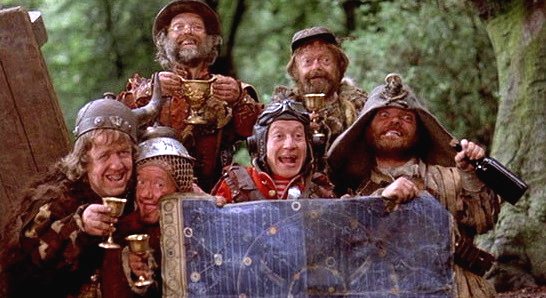


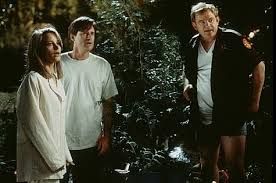
house_of_the_devil_1.jpg)







_06.jpg)
